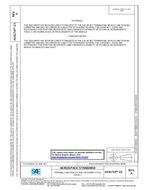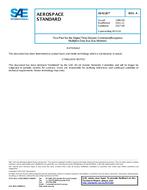Click here to purchase
This document establishes safety limits and performance requirements for gaseous hydrogen fuel dispensers used to fuel Hydrogen Powered Industrial Trucks (HPITs). It also describes several example fueling methods for gaseous hydrogen dispensers serving HPIT vehicles.
SAE J2601-3 offers performance based fueling methods and provides guidance to fueling system builders as well as suppliers of hydrogen powered industrial trucks and operators of the hydrogen powered vehicle fleet(s). This fueling protocol for HPITs can support a wide range of hydrogen fuel cell hybrid electric vehicles including fork lifts, tractors, pallet jacks, on and off road utility, and specialty vehicles of all types.
The mechanical connector geometry for H25 and H35 connectors are defined in SAE J2600 Compressed Hydrogen Surface Vehicle Refueling Connection Devices.
Multiple fueling methods are described in this document and include:
-
Fill to Service Pressure with fixed area flow-limiting device
-
Fill to Target Pressure with fixed area flow-limiting device
-
Fill to Target Pressure with variable area flow-limiting device
These three dispensing methods are detailed in Section 6 and include a schematic of control components for vehicle fueling. These methods allow for market differentiation with varied target fill pressures relative to 100% SOC. These methods are examples of how dispensers may function but are not intended to limit options for new dispenser technologies or fueling methods, provided they meet the performance based requirements.
This document is suitable for all vehicle tank fueling systems above 18 L water volume and may be used for fueling of all types of Hydrogen Powered Industrial Trucks (HPIT’s), and Battery Replacement modules (BRM’s).
The fueling limits shown in Section 5 are harmonized with the fueling assumptions used for on-board fuel systems that comply with CSA HPIT-1.
Product Details
- Published:
- 06/01/2013
- File Size:
- 1 file , 450 KB


